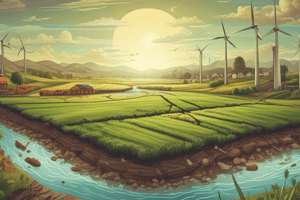Podcast
Questions and Answers
What is the main goal of sustainable agriculture?
What is the main goal of sustainable agriculture?
- Monopolizing the market with a single crop
- Maximizing profit at all costs
- Protecting the environment and conserving resources (correct)
- Ignoring the needs of future generations
How does regenerative farming contribute to climate resilience?
How does regenerative farming contribute to climate resilience?
- By increasing greenhouse gas emissions
- By promoting unsustainable pest management practices
- By depleting soil organic matter
- By rebuilding soil organic matter and restoring degraded ecosystems (correct)
Why is crop diversification important in the context of climate change?
Why is crop diversification important in the context of climate change?
- To deplete soil nutrients faster
- To increase reliance on a single crop for economic gains
- To simplify pest management practices
- To limit damage from extreme weather events and promote sustainable pest management (correct)
What role does precision agriculture play in sustainable farming?
What role does precision agriculture play in sustainable farming?
What are some benefits of agroecological practices mentioned in the text?
What are some benefits of agroecological practices mentioned in the text?
Which renewable energy source harnesses sunlight for electricity generation?
Which renewable energy source harnesses sunlight for electricity generation?
How does integrating agriculture and renewable energy systems benefit communities?
How does integrating agriculture and renewable energy systems benefit communities?
What is the main goal of harnessing geothermal power?
What is the main goal of harnessing geothermal power?
How do sustainable agriculture and renewable energy contribute to economic growth?
How do sustainable agriculture and renewable energy contribute to economic growth?
Why are sustainable agriculture and renewable energy considered vital tools for building climate-resilient communities?
Why are sustainable agriculture and renewable energy considered vital tools for building climate-resilient communities?
Flashcards are hidden until you start studying
Study Notes
Building Resilient Communities through Sustainable Agriculture and Renewable Energy
Climate change is a pressing issue that calls for bold and strategic actions to bolster community resilience. Two key avenues for achieving this goal lie in the spheres of sustainable agriculture and renewable energy. This article explores these promising fields, illustrating how they can help communities adapt and thrive in a shifting climate.
Sustainable Agriculture
Sustainable agriculture is a system that meets the needs of the present without compromising the ability of future generations to meet their own needs. This forward-looking approach aims to foster climate-resilient farming practices that promote food security, conserve resources, and protect the environment.
Regenerative farming: This holistic approach to agriculture aims to rebuild soil organic matter and restore degraded ecosystems, promoting healthy crops and livestock while reducing greenhouse gas emissions.
Crop diversification: Growing a variety of crops, rather than relying on a single crop, can be more resilient to climate change by limiting damage from extreme weather events and promoting more sustainable pest management practices.
Precision agriculture: Utilizing data-driven technologies to optimize resource use, reduce waste, and minimize negative environmental impacts.
Agroecological practices: Implementing ecologically sound farming techniques, such as intercropping, agroforestry, and rotation, to improve soil health, increase soil carbon storage, and reduce greenhouse gas emissions.
These practices not only promote climate-resilient farming but also offer benefits such as increased food security, improved nutrition, and reduced environmental impacts.
Renewable Energy
Renewable energy sources, such as solar, wind, and hydro power, offer a cleaner and more sustainable approach to meeting energy demands.
Solar energy: Harnessing sunlight for electricity generation, which can be integrated into existing power grids or used for off-grid applications.
Wind energy: Utilizing kinetic energy from wind to generate electricity, which can be used to meet a diverse range of energy demands.
Hydro power: Harnessing the kinetic energy of flowing water via dams, turbines, or micro-hydro systems to generate electricity.
Geothermal power: Extracting heat from the Earth's natural reservoirs, which can be used for electricity generation or heating and cooling applications.
Bioenergy: Utilizing biomass, waste, and other organic materials for electricity, heat, and fuel production.
Incorporating renewable energy sources into communities helps to reduce greenhouse gas emissions, improve air quality, and promote energy security and affordability.
Combining Strengths
The synergy between sustainable agriculture and renewable energy offers even greater potential for building community resilience.
Food-energy synergy: Integrating agriculture and renewable energy systems can help to reduce resource competition and produce food and energy more efficiently.
Resource conservation: Sustainable agriculture promotes resource conservation and reduces waste, while renewable energy sources help to decarbonize energy systems.
Economic benefits: The development and implementation of renewable energy and sustainable agriculture strategies can create jobs and stimulate economic growth.
Conclusion
Sustainable agriculture and renewable energy offer vital tools for building climate-resilient communities that are adaptable, innovative, and sustainable. By exploring these promising fields, communities can reduce their vulnerability to climate change and promote a sustainable future.
Studying That Suits You
Use AI to generate personalized quizzes and flashcards to suit your learning preferences.




